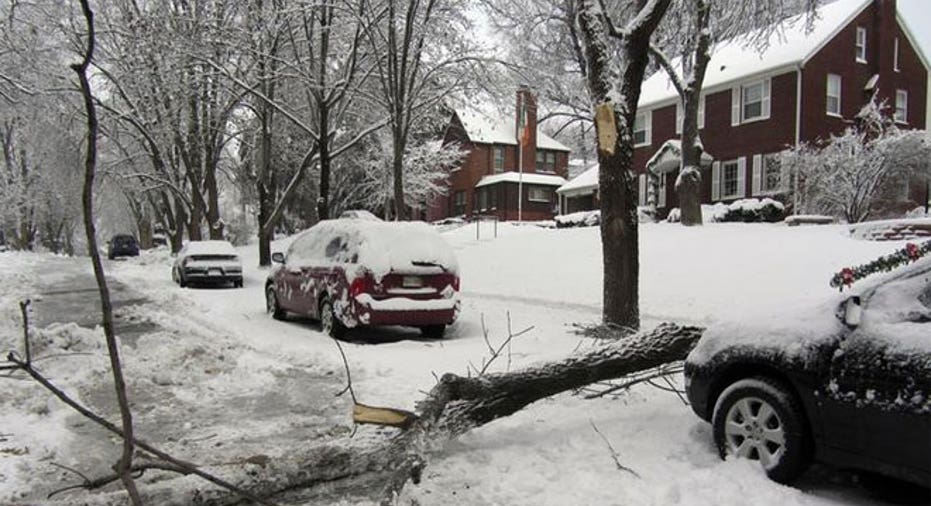Are You Covered If Winter Weather Damages Your Home?

In addition to the health and safety dangers of sub-zero temperatures, blinding snowstorms and inconspicuous ice sheets, winter weather can also be incredibly dangerous to your home. Homeowners must consider a number of winter weather issues, including legal liabilities to watch out for and knowing whether your homeowners insurance policy has you covered.
Winter damage culprits
The two main causes of wintertime home damage are snow and ice. The weight of snow can collapse a roof or damage an automobile. And when snow inevitably melts, it can cause major flooding and problems with home septic systems.
The major problems with ice, from a homeowner’s legal perspective, include slip-and-falls and frozen pipelines. Ice accumulating on trees can also cause damage if a tree branch falls on your home — or even worse, your neighbor’s home.
What is generally covered
A homeowners insurance policy typically covers damage that results directly from winter weather events. Direct damage includes trees falling on homes, roof collapse due to snow accumulation, wind damage during a blizzard, displacement due to a major power outage, and frozen or burst pipes (subject to exception).
What is probably not covered: negligence
A curveball factor can affect the damage your insurance policy covers: homeowner negligence, which means neglecting the standard care that allows your home to withstand normal winter weather. This may include factors such as:
- Pipes. If the insurance company believes that pipes broke because they were neglected — if the heat was off, or the pipes were not drained, for example — you may be denied coverage
- Trees. If a homeowner knew that a tree or its limbs were at risk of falling but took no steps to trim or remove them, the homeowner can be held liable if they do fall and cause damage
- Snow. If your home is damaged due to melting snow seeping through the roof, and the adjuster determines that the roof is in disrepair or is improperly installed, you will be footing the bill on your own.
- Ice. Laws vary by location, but there may be rules regarding prompt snow and ice removal. In New York City, rental lease agreements generally stipulate that either the owner or the renter must clear sidewalks within four hours after snow stops falling.
- Storms. Evidence that a homeowner could have done more to protect the property before or during a storm will be taken into consideration and could result in a denial of coverage.
What is definitely not covered: flood damage
The big issue to watch out for is flooding, which is not covered by a homeowners insurance policy. A major snowstorm followed by a warm snap often results in overworked drainage systems and flooding. If you live in a climate where this is likely to happen, flood insurance is a must.
Also within this category is the damage that can occur when an overburdened septic system backs up into your home, causing raw sewage to flow from the drains. A flood insurance policy will likely cover this scenario, whereas a general homeowners policy will not.
Good neighbors
One common question involves damage occurring to a home caused by a tree or flooding from a neighbor’s property. In those cases, the insurance company will first look into whether the neighbor was negligent or otherwise blamable in the event. If there’s no evidence of negligence, the owner of the damaged structure is then responsible for repair to that structure, but their policy will cover the damage.
However, if the neighbor is found to be blamable in the event, the case may result in a civil lawsuit if the parties can’t reach a workable solution. Consult with an attorney if you find yourself at such an impasse.
Making a claim
Insurance companies advise making a claim as soon as practically possible following a major weather event. This will allow the adjuster the best opportunity to assess the damage and make a factually solid determination of whether the issue is covered under the policy.
If your damage is minimal, you may want to consider forgoing a claim to your insurer since making multiple claims can raise your premiums. If it seems likely that your issue won’t cost much more than the deductible, it may be wise to cut your losses and complete the repairs without involving your insurance provider.
More From Zillow:
- Think You’re Covered? 6 Problems Your Home Insurance May Not Help With
- Make Your Home Less Prone to Falls from Ice and Snow on Walkways
- Is Your Home Ready to Keep You Warm This Winter?
Note: The views and opinions expressed in this article are those of the author and do not necessarily reflect the opinion or position of Zillow.



















